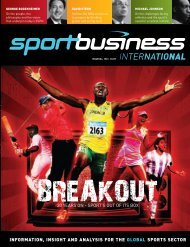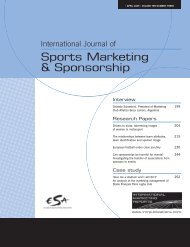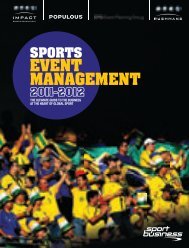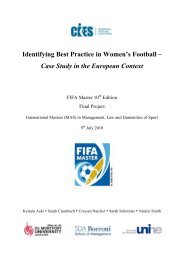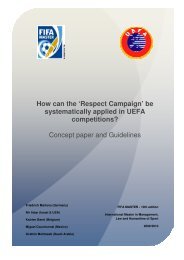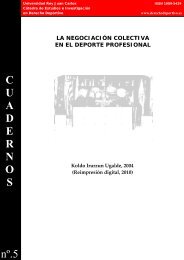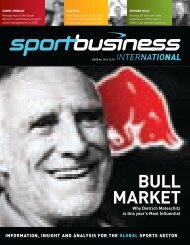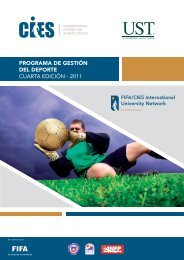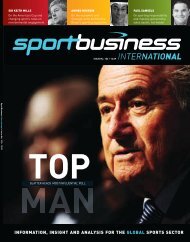Sports Marketing & Sponsorship - FIFA/CIES International University ...
Sports Marketing & Sponsorship - FIFA/CIES International University ...
Sports Marketing & Sponsorship - FIFA/CIES International University ...
- No tags were found...
Create successful ePaper yourself
Turn your PDF publications into a flip-book with our unique Google optimized e-Paper software.
Is motorsport “a race out of place”?events. The symbolic impact of motorsports events inthese spaces is a powerful signifier of consumeristlifestyles. Their location helps to promote activities andproducts that are incompatible with a responsibleapproach to climate change and peak oil. These twochallenges are now emerging as significant threats toeconomies and societies.The case studies examine motorsports events inCanberra, Melbourne, Adelaide and Surfers Paradise.The locations of the events are significant in terms ofnational symbolism, historic cultural significance ortheir relevance as an international tourist destination.The case studies demonstrate that allowingmotorsports events to be staged in significant urbanplaces supports the growth of conspicuousconsumption, pollution and the use of fossil fuels,both directly via the events themselves and in thelong-term impacts on the behaviour of motorists andconsumers. Motorsports events and their associatedcorporate interests represent many of the attitudes andbehaviours that will need to be changed or abandonedto limit resource depletion and greenhouse gascreation.The marketing of sports events should not beconsidered independently of the major challengesfacing the world. Civic leaders have a responsibility todemonstrate a commitment to a sustainable futurethrough a policy of reserving their city’s significantpublic spaces for sporting events that are best practicemodels for sustainability. Motorsports events shouldnow be considered ‘out of place’ as mega-events in acity’s major public spaces.IntroductionThere is a large body of literature on the marketing ofplaces, where civic elites use a range of strategies,including icons, slogans and logos, changes to thebuilt environment, and festivals and spectacles suchas hallmark events, to change the image of their city(Gotham, 2002; Lowes, 2002b; Pawson, 1999). Theneed to cultivate a positive city image has assumed anurgency in cities throughout the world over the pastthree decades. In fact, as far as civic boosters areconcerned “image is everything” (Gibson & Lowes,2006, p.3). As a result, a whole industry hasdeveloped around the theme of place marketing.Place marketing is an important strategy by whichcities attempt to distinguish themselves in anincreasingly global economy. Events corporations turnhallmark events into an industry in which cities andstates compete for the opportunity to host “ever morespectacular, exotic and titillating attractions” to enticetourists and investors (Gotham, 2002, p.1737). Thepursuit of hallmark sports entertainment mega-eventsis now a standard feature of place competitionstrategies adopted by cities jostling for position in theglobal fray (Smith, 2005; Stevenson, 1998). Suchevents have become part of the place marketingindustry, where urban governance has switched frommanagerialism to entrepreneurism (Pawson, 1999).One type of major sporting event that is becomingincreasingly important in image-making in citiesthroughout the world is the motorsports mega-eventspectacle in an urban street circuit.For the cities that stage them, however, mega-eventsare best viewed as “short-term events with long-termconsequences”. They are associated with “the creationof infrastructure and event facilities often carryinglong-term debts and always requiring long-term useprogramming”(Roche, 1994, p.1). Mega-sportsevents are highly political phenomena. The term‘political’ here does not reflect the planning ideal ofdemocratic or community-based planning processes,but rather the reverse.“Hallmark events are not the result of a rationaldecision-making process. Decisions affecting thehosting and the nature of hallmark events grow out ofa political process. The process involves the values ofactors (individuals, interest groups and organisations)in a struggle for power” (Hall, 1989, p.219; cited inRoche, 1994).Such a state of affairs fosters the culture of secrecythat is characteristic of neoliberal governancestrategies. Politicians generally announce the securingRESEARCH PAPER● OCTOBER 2009 ● <strong>International</strong> Journal of <strong>Sports</strong> <strong>Marketing</strong> & <strong>Sponsorship</strong>61




